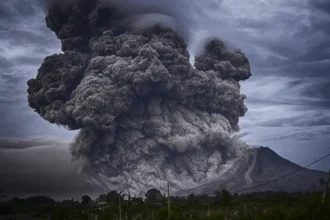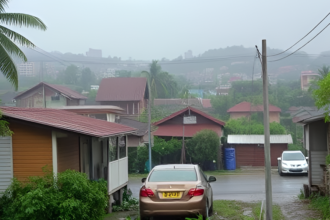Indian officials have prohibited the production and export of two highly addictive opioids, tapentadol and carisoprodol, after an investigation revealed that they are causing the growing opioid crisis in West Africa.
According to a formal announcement by India’s Drugs Controller General, Dr. Rajeev Singh Raghuvanshi, the decision was reached immediately after specialists examined “the potential of drug abuse and its harmful impact on the population.” The move is a component of broader global efforts to address the opioid crisis, which has devastated communities worldwide. India, one of the largest manufacturers of pharmaceuticals, is essential in preventing the misuse of its goods.
What Are Tapentadol and Carisoprodol?
According to a formal announcement by India’s Drugs Controller General, Dr. Rajeev Singh Raghuvanshi, the decision was reached immediately after specialists examined “the potential of drug abuse and its harmful impact on the population.” The move is a component of broader global efforts to address the opioid crisis, which has devastated communities worldwide. India, one of the largest manufacturers of pharmaceuticals, is essential in preventing the misuse of its goods.
The combination of these two drugs is not approved for use in medicine anywhere in the world due to its severe side effects, which include breathing issues, seizures, and the potential for a fatal overdose. However, they have become popular street drugs in some West African countries because to their affordability and ease of access, which has made the opioid problem in the region worse. Increased mortality rates, addiction, and physical dependence are just a few of the terrible outcomes that can result from prolonged use.
How Was the Illegal Drug Trade Exposed?
An undercover agent posing as an African businessman who wished to supply opiates to Nigeria paid a visit to a pharmaceutical company in India. During this visit, Vinod Sharma, one of the company’s directors, was open about the side effects of the drugs. For example, he admitted that taking two or three pills might make users “relax” and “high.”
Sharma acknowledged that the drugs had detrimental health effects in a covertly recorded chat, stating, “This is very harmful for the health,” but he also justified their sale by stating, “Nowadays, this is business.” This candid admission illustrated the avarice that drives the illegal opiate trade.
Which Company Was Involved?
The medications were discovered to be illegally exported to Ghana, Nigeria, and Cote D’Ivoire by Aveo Pharmaceuticals and its sibling business, Westfin International. Millions of these tablets had been delivered to these nations, according to publicly available export data.
Packages of these tablets, branded with Aveo, were being sold openly on Nigerian streets and in cities around Cote D’Ivoire, according to additional investigations. Nigeria continues to be the biggest market for opioids, with an estimated four million people abusing these medications, which exacerbates the opioid issue. According to local community reports, the prevalence of addiction has increased, especially among young people who are attracted to these drugs’ potent effects and inexpensive cost.
What Actions Have Been Taken?
The Food and Drug Administration (FDA) of India raided Aveo’s manufacturing plant in Mumbai after the disclosures, confiscating all of its inventory and stopping additional production. Authorities affirmed that the corporation and any individuals involved in the illegal activity will face legal action. The prompt action demonstrates India’s resolve to take tough measures against pharmaceutical companies that violate the law.
Additionally, the FDA declared that it was “fully prepared” to take strong action against anyone involved in unlawful activities that damage the nation’s reputation. To help fight the opioid crisis, more checks have been mandated to guarantee that these drugs are completely removed from the supply chain. To stop such illicit exports in the future, Indian authorities have started collaborating with international regulatory organizations.
What Are the Implications of This Ban?
Now that the prohibition is in place, officials intend to stop the illicit flow of these dangerous opiates into West Africa. The regulatory authorities’ prompt action highlights the need for stronger restrictions to prevent opioid usage and the growing global concern over the opioid crisis.
Although the ban is a start in the right direction, experts caution that more needs to be done to address the underlying causes of opiate consumption in West Africa. The region’s governments need to focus on enhancing access to rehabilitation programs, enforcing stricter laws, and raising public knowledge of the risks associated with opiate addiction. The demand for these drugs can persist in the absence of comprehensive solutions, opening up new channels for illicit trading.
What Needs to Be Done Next?
To combat the opioid crisis, a multifaceted strategy is needed. To enforce stronger regulations, enhance border security, and impose more severe penalties for individuals engaged in the illicit drug trade, authorities in West Africa and India must work together. Public health campaigns must also be started to inform the public about the risks of opiate misuse and provide assistance to individuals who are addicted.
The economic causes of drug usage must also be addressed by West African governments. Poverty, high unemployment, and limited access to mental health services are all factors in the region’s growing opioid crisis. Governments can contribute to lowering the demand for illegal substances by funding healthcare, education, and job creation.
How Can the International Community Help?
The opioid crisis is a worldwide problem that calls for worldwide solutions; it is not confined to any one nation. International agencies, such as the World Health Organization and the United Nations, need to work harder to control pharmaceutical exports and dismantle illicit drug distribution networks. Funding for addiction treatment programs and law enforcement training should also be provided to nations impacted by opioid usage.
There is a role for pharmaceutical corporations as well. Increased transparency in distribution networks, frequent audits, and stricter compliance guidelines can all aid in preventing abuse. The pharmaceutical industry’s goal should be centered on ethical duty to make sure that drugs intended for medicinal use don’t contribute to the global addiction crisis.
Conclusion
An important step in the fight against the opioid crisis in West Africa has been taken by India with its firm decision to prohibit the production and export of tapentadol and carisoprodol. But dealing with this catastrophe need for constant attention, global collaboration, and all-encompassing public health plans. Authorities can make long-lasting headway in the battle against addiction and drug abuse by addressing the root of the issue and lowering the demand for opioids.
Many regions of the world have been devastated by the opioid epidemic, and if nothing is done, it will only get worse. Governments, law enforcement, and health organizations are now responsible for making sure that the appropriate steps are taken to safeguard vulnerable groups from the risks associated with opiate usage.








